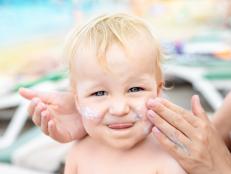Here's Why New Dads May Suffer From Postpartum Depression
New research suggest that new dads may suffer from postpartum depression too, and researchers think they have pinpointed how hormones play a role.


iStock
In recent years, health care professionals are making more of an effort to ensure new moms are feeling healthy after giving birth--both physically and mentally. While more women are talking openly about their struggles with postpartum depression and advocating for all mothers to evaluate if they need treatment, usually dads are left out of the discussion. However, new research suggest that new dads may suffer from postpartum depression too, and researchers think they have pinpointed how hormones play a role.
According to a new study in the journal Hormones and Behavior, new fathers may experience postpartum depression after the birth of their child due to hormonal shifts in testosterone levels. For the study, researchers measured saliva samples to find each father's testosterone levels. What they discovered was the men with dipping levels of the hormone were more likely to feel depressed.
Often referred to as paternal postpartum depression or PPPD, one study says that an estimated 10% of new fathers could experience symptoms of PPPD. However, there isn't much data available about the prevalence of PPPD among dads. According to Centers for Disease Control, nearly 1 in 5 new mothers experience symptoms of PPD during the first year of parenthood. So researchers are hopeful that these new findings will open avenues of help for new parents.
"Our findings suggest a potential biological and hormonal correlate of depression during the postpartum period," says Darby Saxbe, the author of the study and an assistant professor of psychology at the University of Southern California.
Symptoms of postpartum depression in men can include feelings of irritability and sadness, anxiety, insomnia and, in extreme cases, thoughts of self-harm. While there are more PPD screenings for new moms, fathers rarely take part in screenings. So getting a diagnosis or treatment as a new father is not as common.
So what can we do with this new information? Be supportive of our partners during those early years of parenting. While it can be taxing on both parents mentally and physically, being able to check in with your partner will help mom, dad, and your baby. This way mom and dad can healthy, happy, and ready to enjoy those precious and often crazy moments of parenthood.















